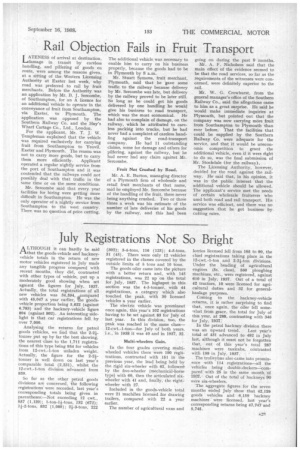Rail Objection Fails in Fruit Transport
Page 33

If you've noticed an error in this article please click here to report it so we can fix it.
LATENESS of arrival at destination, damage in transit by careless handling, and pilfering of goods en route, were among the reasons given, at a sitting of the Western Licensing Authority at Exeter last week, why road was preferred to rail by fruit merchants. Befpre the Authority was an application by Mr. B. J. Sercombe, of Southampton, for an A licence for an additional vehicle to operate in the conveyance of fruit from Southampton, via Exeter, to Plymouth. The application was opposed by the Southern Railway Co. and the Hay's Wharf Cartage Co., Ltd.. London.
For the applicant, Mr. T. J. W. Templeman explained that the vehicle was required exclusively for carrying fruit from Southampton to Yeovil, Exeter and Plymouth. The reason was not to carry more goods, but to carry them more efficiently. Applicant operated a regular nightly service from the port of Southampton and it was contended that the railways could not possibly deal with that traffic in the same time or on the same conditions.
Mr. Sercombe said that every year facilities for hiring were getting more difficult in Southampton. He was the only operator of a nightly service from Southampton to the west country. There was no question of price cutting. The additional vehicle was necessary to enable him to carry on his business properly, because the goods had to be in Plymouth by 8 a.m.
Mr. Stuart Symons, fruit merchant. Plymouth, said that he gave some traffic to the railway because delivery by Mr. Sercombe was late, but delivery by the railway proved to be later still. So long as he could get his goods delivered by one handling he would give his business to road transport, which was the most economical. He had also to complain of damage, on the railway, which he attributed to careless packing into trucks, but he had never had a complaint of careless handling against the road-transport company. He had 11 outstanding claims, some for damage and others for pilfering, against the railway, but he had never had any claim against Mr. Sercombe.
Fruit Not Crushed by Road.
Mr. A. E. Burton, managing director of a Plymouth firm of wholesale and retail fruit merchants of that name, said he employed Mr. Sercombe because of the handling of the fruit, there never being anything crushed. Two or three times a week was his estimate of the number of late deliveries of his goods by the railway, and this had been going on during the past 9 months.
Mr. A. F. Nicholson said that the main effect of the evidence seemed to be that the road services, so far as the requirements of the witnesses were concerned, were definitely superior to the rail.
Mr. W. G. Crowhurst, from the general manager's office of the Southern Railway Co., said the allegations came to him as a great surprise. He said he would make immediate inquiries at Plymouth, but pointed out that the company was now carrying more fruit from Southampton to Plymouth than ever before. That the facilities that could be supplied by the Southern Railway Co. were adequate for the service, and that it would he uneconomic competition to grant the additional vehicle, even if it were right to do so, was the final submission of Mr. Stockdale (for the railway).
The Licensing Authority, however, decided for the road against the railway. He said that, in his opinion, it was in the public interest that the additional vehicle should be allowed. The applicant's service met the needs of certain wholesale fruiterers who used both road and rail transport. His service was efficient, and there was no suggestion that he got business by cutting rates.




















































































